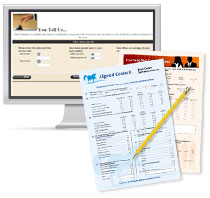Blog Series: Tips to Selecting the Best Survey Method: #3 Questions
 This is the third blog post in a series where we discuss issues you’ll want to take into consideration as you plan your next survey. Each mode of survey research – online, paper, mobile, or kiosk survey, or a telephone or face-to-face interview, or a combination of survey modes – has its own advantages and disadvantages. In the first blog post, we discussed potential population issues and in the second blog post we discussed sampling issues. We now move on to question issues.
This is the third blog post in a series where we discuss issues you’ll want to take into consideration as you plan your next survey. Each mode of survey research – online, paper, mobile, or kiosk survey, or a telephone or face-to-face interview, or a combination of survey modes – has its own advantages and disadvantages. In the first blog post, we discussed potential population issues and in the second blog post we discussed sampling issues. We now move on to question issues.
Question issues
At times, the types of questions and topic(s) that you want to ask respondents will determine the mode of survey research. There are several important issues with questions that you need to consider when planning your survey.
- What types of questions do you plan to ask respondents? The types of questions you ask can have an impact on response rates. Will you ask personal or demographic questions? Do you require very detailed responses? Can you anticipate what the most frequent or important types of responses will be, and develop logical closed-ended questions?
- Will your questions be complex? At times, the topic or subject matter can be very involved. The questions you ask will be multifaceted. Consider branching to sub-questions or route respondents to questions that are relevant to them based on answers given in previous questions.
- Do you need to screen respondents? Including a screening question may be necessary. A screening question can help determine whether the respondent is qualified to complete your questionnaire. For example, you wouldn’t want to ask someone their opinions about a specific product without first screening them to find out whether they have any experience using the product. Additionally, you may have to screen on several variables (e.g., gender, age). Multifaceted screening is much easier using online surveys or mobile surveys, but can become more difficult with paper surveys as you run the risk of confusing or frustrating the respondent.
- Will you control the sequence of questions? Is the layout of your survey constructed in a manner that has a logical sequence of questions? Would you rather randomize the order of questions? Or, do you want to keep the same question sequence, but randomize the question options.
- Will you ask lengthy questions? If your topic or subject matter is complex, you may need to provide your respondents with some background detail for each complex question or section of questions. Will your respondents be receptive to complex questions or will they lose interest, risking low response rates.
- Will you use long response scales? If you are asking respondents about the different household kitchenware products they use, you may have a very lengthy list of response options (microwave, food processor, blender, hand mixer, slow cooker, double boiler, waffle maker, etc.). If you are conducting a phone survey or a face-to-face interview, it may be difficult to ask about each of these products in such a short period of time.
View the previous posts in the series:



